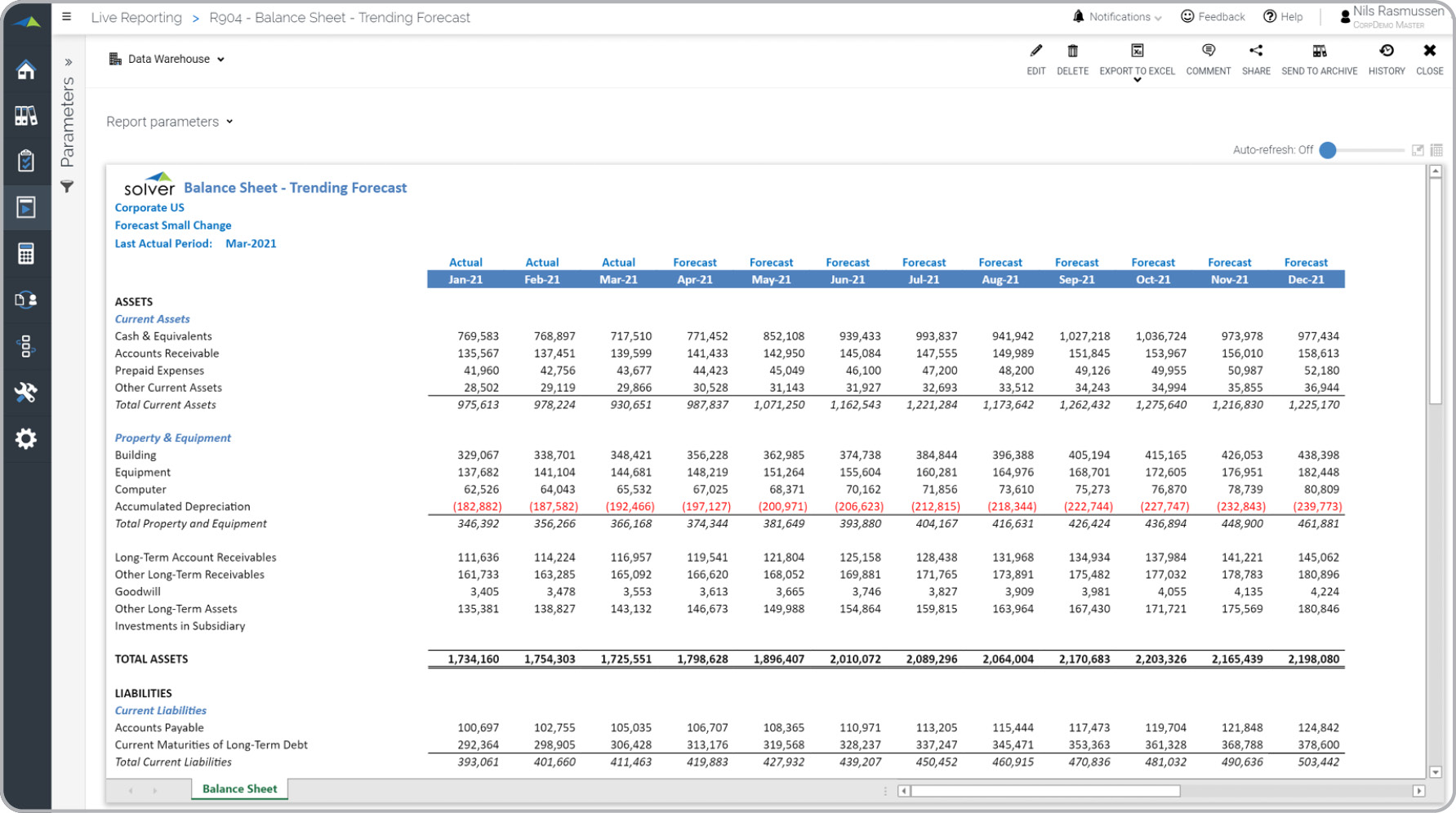Monthly Balance Sheet Forecast Report for Sage Intacct
What is
a
Monthly Balance Sheet Forecast Report
? The Monthly Balance Sheet Forecast Report is a valuable tool for CFOs and planning managers, offering estimates of liability and asset components that contribute to the cash flow forecast. It includes historical data up to the current period and forecasts for the remaining months of the year. The report provides insights into trends, receivables, and payables timing, aiding decision-making.
Purpose of
Balance Sheet Forecast Models Balance Sheet Forecast Models serve to drive the Cash Flow forecast and facilitate timely decision-making for companies and organizations. When integrated into Financial Planning & Analysis (FP&A) and Accounting practices, these models enhance asset, liability, and cash flow decisions while mitigating the risk of unmet financial obligations.
Benefits to Users The use of Balance Sheet Forecast Models brings significant benefits to business users, empowering them to make better decisions and improve efficiency in their roles. By providing comprehensive insights into liabilities, assets, and cash flow, these models enable a deeper understanding of the financial position. Access to accurate and timely information allows managers to make informed choices that optimize resource allocation, identify risks, and capitalize on growth opportunities. Additionally, these forecast models enhance operational efficiency by streamlining financial planning processes and reducing manual data analysis efforts. Leveraging the benefits of Balance Sheet Forecast Models enables business users to effectively navigate financial management complexities and drive sustainable business growth.
Balance Sheet Forecast Model
Example Here is an example of a Monthly Balance Sheet Forecast Report with actual data year-to-date and forecast for the rest of the year.
You can find hundreds of additional examples
here.
Who Uses This Type of
Forecast Template
? The typical users of this type of forecast template are: CFOS, Controllers and Planning Managers.
Other
Forecast Template
s Often Used in Conjunction with
Balance Sheet Forecast Models Progressive Financial Planning & Analysis (FP&A) and Accounting Departments sometimes use several different Balance Sheet Forecast Models, along with profit & loss and cash flow forecasts and other management and control tools.
Where Does the Data for Analysis Originate From? The Actual (historical transactions) data typically comes from enterprise resource planning (ERP) systems like: Microsoft Dynamics 365 (D365) Finance, Microsoft Dynamics 365 Business Central (D365 BC), Microsoft Dynamics AX, Microsoft Dynamics NAV, Microsoft Dynamics GP, Microsoft Dynamics SL, Sage Intacct, Sage 100, Sage 300, Sage 500, Sage X3, SAP Business One, SAP ByDesign, Netsuite and others. In analyses where budgets or forecasts are used, the planning data most often originates from in-house Excel spreadsheet models or from professional corporate performance management (CPM/EPM) solutions.
What Tools are Typically used for Reporting, Planning and Dashboards? Examples of business software used with the data and ERPs mentioned above are:
- Native ERP report writers and query tools
- Spreadsheets (for example Microsoft Excel)
- Corporate Performance Management (CPM) tools (for example Solver)
- Dashboards (for example Microsoft Power BI and Tableau)
- View 100’s of reporting, consolidations, planning, budgeting, forecasting and dashboard examples here
- Discover how the Solver CPM solution delivers financial and operational reporting
- Discover how the Solver CPM solution delivers planning, budgeting and forecasting
- Watch demo videos of reporting, planning and dashboards
TAGS: Reporting, Forecasting, Budgeting, CPM, ERP, Dashboards, Financial Reporting, Template Library
Global Headquarters
Solver, Inc.
Phone: +1 (310) 691-5300

